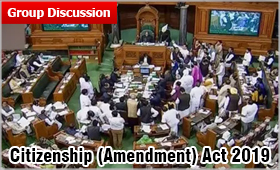
Citizenship Amendment Act amends the definition of illegal immigrant for Hindu, Sikh, Parsi, Buddhist and Christian immigrants from Pakistan, Afghanistan and Bangladesh, who have lived in India without documentation. This has led to Nationwide student-led protests. Some students from IIM Bangalore, IIM Ahmedabad and other B-schools have also joined protests. Since this is a big Political development, it may appear in GD and Essay Topics for MBA Admissions 2020. MBAUniverse.com presents a discussion on key aspects.
Also Read
The President of India gave his assent to the Citizenship (Amendment) Bill, 2019, on December 12, a day after it was passed by the Rajya Sabha. The CAB bill was passed in the Indian Parliament on December 11, 2019 with 125 votes in favor and 105 votes against. Hence the CAB Bill became the CAA Act. Soon after the protests have broken out across India against the Citizenship (Amendment) Act 2019. In response, the Government has shut down the Internet and issued Section 144 in many cities, that prohibits a gathering of four or more people in a place.
Let’s understand Citizenship (Amendment) Act or CAA 2019 in detail.
What is Citizenship (Amendment) Act 2019?
The Act seeks to amend the definition of illegal immigrant for Hindu, Sikh, Parsi, Buddhist and Christian immigrants from Pakistan, Afghanistan and Bangladesh, who have lived in India without documentation. They will be granted fast track Indian citizenship in six years. The legislation applies to those who were “forced or compelled to seek shelter in India due to persecution on the ground of religion”. It aims to protect such people from proceedings of illegal migration. The cut-off date for citizenship is December 31, 2014 which means the applicant should have entered India on or before that date. Indian citizenship, under present law, is given either to those born in India or if they have resided in the country for a minimum of 11 years.
What is Government’s rationale?
Centre says these minority groups (Hindu, Sikh, Parsi, Buddhist and Christian immigrants) have come escaping persecution in Muslim-majority nations. However, critics say that the logic is not consistent, and bill is discriminatory – the bill does not protect all religious minorities, nor does it apply to all neighbours. For example, the Ahmedia Muslim sect and even Shias face discrimination in Pakistan. Rohingya Muslims and Hindus face persecution in neighbouring Burma, and Hindu and Christian Tamils in neighbouring Sri Lanka. The government responds that Muslims can seek refuge in other Islamic nations.
What is the Opposition's objection?
According to Opposition Parties and Critics, the CAB discriminates against Muslims by declaring India a welcome refuge to all other religious communities. They say that it seeks to legally establish Muslims as second-class citizens of India by providing preferential treatment to other groups. This violates the Constitution’s Article 14, the fundamental right to equality to all persons.
So, what next?
While the President gave his assent to the Citizenship (Amendment) Bill, 2019, on December 12, the Home Ministry has yet to notify the rules to “operationalize” the law. The notification of rules may now have to wait as a decision in this regard will be taken after seeking experts’ advice since the matter is sub judice before the Supreme Court. The petitions against the Act are listed for hearing on January 22.
NRC and how is it related to the Citizenship (Amendment) Act 2019?
A state-specific exercise, National Register of Citizens (NRC) identified illegal immigrants from Assam on the Supreme Court's order. But, as soon as the Citizenship Amendment Bill was given Presidential assent making it a law, speculations started about another move - the National Register of Citizens or NRC. What is NRC and does it relate to CAA? Let’s find out.
What is National Register of Citizens?
Simply put, NRC is the National Register of Citizens. It has been adopted by many countries in the World. In India, NRC identified illegal immigrants from Assam on the Supreme Court's order. This has been a “state-specific exercise” to keep its ethnic uniqueness unchanged. But ever since its implementation, there has been a call for its nationwide implementation. Many top BJP leaders including Home Minister Amit Shah have proposed that the NRC should be implemented across India. According to its proponents, NRC will effectively enable the government to identify infiltrators who have been living in India illegally, detain them and deport them to where they came from.
Will any particular community lose out if NRC is implemented along with CAA?
CAA, if implemented, will profile illegal immigrants in India. But Hindus, Christians, Sikhs, Buddhist, Jains and Parsis coming from Afghanistan, Pakistan and Bangladesh won't be affected, if they claim they have arrived India after fleeing religious persecution. Which essentially means, if a nationwide NRC comes in as proposed, any illegal immigrant from other than Pakistan, Afghanistan and Bangladesh, will be affected. And as for those three nations, people coming from there who belong to the Muslim community will also be affected as they are not included in the Citizenship Amendment Act.
What will happen to the affected?
As proposed, if a nationwide NRC comes in place, the affected will be detained and taken to large detention centres, as it is happening in Assam. After that, the Ministry of External Affairs will get in touch with the concerned nations. If the details of the detained are matched and accepted by the concerned nations, deportations will follow.
Whether a nationwide NRC will come in place or not is yet to be known. But going by the speed the government is moving in bringing bold legislations like abrogation of Article 370 and CAB in 2019, a pan-India NRC Bill can’t be ruled out in 2020.
(This article was published on 21.12.2019. We shall update this article in coming weeks.)
Also Check Latest Group Discussion GD Topics
Exam 2024 Notification